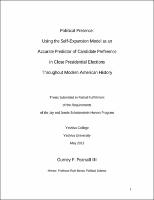Please use this identifier to cite or link to this item:
https://hdl.handle.net/20.500.12202/4086| Title: | Political Presence: Using the Self-Expansion Model as an Accurate Predictor of Candidate Preference in Close Presidential Elections Throughout Modern American History |
| Authors: | Pearsall, Gurney F., III |
| Keywords: | Self-presentation --Political aspects. Politicians --Psychology. Branding (Marketing) Marketing --Political aspects. Political psychology. Public relations and politics. |
| Issue Date: | May-2013 |
| Publisher: | Yeshiva College |
| Abstract: | This thesis argues that the Inclusion of Other in the Self Scale reliably predicts candidate preference. This scale has so far only been utilized psychologically in the context of close interpersonal relationships, but there is reason to believe that it can be useful politically in the context of close parasocial relationships. To include another in oneself is to self-expand, or broaden one’s personal identity by embracing an other cognitively, behaviorally and/or affectively. The paper defines its key term, “self,” based on two recurring themes in great political writings about the self: persistence and corporeality. Four ideal types of self emerge from Plato (self as persistent but not corporeal), Niccolo Machiavelli (self as corporeal but not persistent), John Locke (self as both persistent and corporeal) and Georg Hegel (self as neither persistent nor corporeal). Two literature reviews (one political and one psychological) about voter turnout are explored. These literature reviews investigate past studies on everything from registration barriers or concurrent elections to a voter’s income or patience, but both reviews neglect to mention candidate appraisal. This hesitance arises from candidate studies’ lack of focus and from the fear that candidate studies are not objective. The Voter/Candidate Relationship Model – which is shown to have the same ongoing, affective, interdependent and meaningful qualities of close interpersonal relationships –is proposed as a unifying, objective model for candidate studies. Statistical tests on a survey of 36 randomly selected individuals supports the hypothesis that self-other overlap reports predict candidate preference and exert a statistically significant impact on the strength of candidate preference, supports (with some reservations on likeability) the hypothesis that these results hold up even when respondent demographic information and specific trait appraisals are controlled for, then offers mixed support for the hypothesis that the influence of self-expansion is most evident in conflicted voters. These results offer not only an explanatory role for the outcome of 2012 and other close elections in recent history, but also a predictive role in elections to come. For that reason, pollsters need to consider adding the Inclusion of Other in Self Scale to their repertoire. |
| Description: | The file is restricted for YU community access only. |
| URI: | https://hdl.handle.net/20.500.12202/4086 https://ezproxy.yu.edu/login?url=https://repository.yu.edu/handle/20.500.12202/4086 |
| Appears in Collections: | Jay and Jeanie Schottenstein Honors Student Theses |
Files in This Item:
| File | Description | Size | Format | |
|---|---|---|---|---|
| Gurney-Pearsall.pdf Restricted Access | 3.1 MB | Adobe PDF |  View/Open |
This item is licensed under a Creative Commons License

